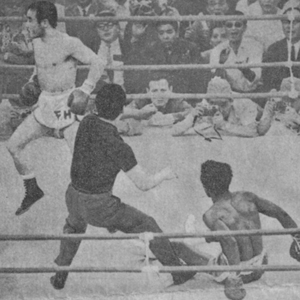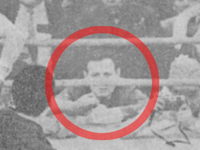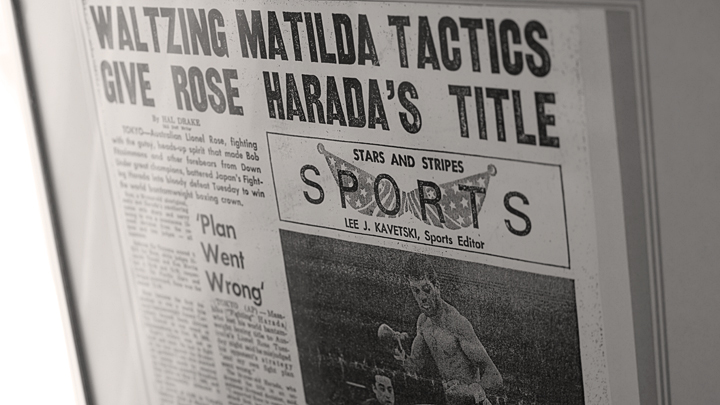『ネットワード・インターナショナル・サービス(以下、Netword)』会長、『パシフィック異文化教育アカデミー(以下、PCA)』学院長「ハロルド・A・ドレイク」がメディア掲載、取材等で取り上げられた記事を紹介致します。
以下、掲載記事
『F・原田、四たび防衛 世界バンタム級カラバロに判定勝ち』

原田は気力で四たび世界の王座を守り抜いた——プロボクシング世界バンタム級選手権者、ファイティング原田(笹崎)対挑戦者同級二位ベルナルド・カラバロ(コロンビア)のタイトルマッチ15回戦は、四日午後八時十八分から東京・千代田の日本武道館に一万一千人の観衆を集めて行われ、原田は苦戦を続けながらも打ちまくり3-0で判定勝ち、昭和四十年十一月アラン・ラドキン(英)の初挑戦をしりぞけていらい四度目のタイトル防衛に成功した。これは元世界フライ級チャンピオン白井義男(王子)がつくった日本選手によるタイトル防衛回数とタイ記録の快挙である。
◇世界バンタム級タイトル・マッチ15戦
ファイティング原田(笹崎)53.5キロ(118ポンド) 判定 ベルナルド・カラバロ(コロンビア)53.5キロ(118ポンド)
ファイティング原田の経歴 東京都世田谷区深沢出身。昭和十八年四月五日生まれ、二十四歳。三十五年二月二十一日原田政彦の本名でフライ級から初出場。三十六年度全日本フライ級新人王となり、三十七年六月エドモンド・エスパルサ(メキシコ)に判定負けするまでに25連勝無敗を記録。同年十月十日ポーン・キングペッチ(タイ)を破って十九歳、最年少の世界フライ級選手権者となる。三十八年の一月のリターン・マッチで敗れ、バンダム級転向。四十年五月十八日エデル・ジョフレ(ブラジル)に挑戦して世界同級選手権を得、現在に至る。51戦48勝(17KO)3敗。三十八年十一月二十五のエミール・デ・レオン(比)戦以来17連勝。

ハロルド・A・ドレイク氏の取材した星条旗新聞の記事
Waltzing Matilda Tactics Give Rose Harada’s
By Hal Drake[S&S Staff Writer]

Japan’s Fighting Harada went down after a left hook by Australia’s Lionel Rose in the ninth round of their world bantamweight title fight. Harada was up almost immediately, but the underdog challenger was too quick for the champion and won a 15-round decision in Tokyo.(AP)
TOKYO — Australian Lionel Rose, fighting with the gutsy, heads-up spirit that made Bob Fitzsimmons and other forebears from Down Under great champions, battered Japan’s Fighting Harada into bloody defeat Tuesday to win the world bantamweight boxing crown.
Rose, a 20-year-old aboriginal, coolly met Harada’s smothering rushes with sharp and nervy boxing to win a unanimous 15round decision from the referee and two judges — all Japanese.
Referee Ko Toyama scored it 72-71 for Rose, while judges Hiroyuki Tezaki and Ken Morita had it 72-69 and 72-70, respectively. On Pacific Stars and Stripes scorecard, Rose was the winner 71-69.
Rose became the the first Australian to win a world title since bantamweight Jimmy Carruthers kayoed South African Vic Toweel in one round at Johannesburg on Nov. 16, 1952.
Rose’s victory was not as brief and easy. He had to fright all the way against the 24-year-old gardener’s son who shocked the boxing world by winning the title from powerful Brazilian Eder Jofre on May 17, 1965, and had successfully defended it four times.
A crowd of 8,000 in Tokyo’s Budokan(Hall of Martial Arts) watched Harada, who reduced 25 pounds for the fight, rush out as though he wanted a short evening’s work. Trying furiously to press home a punishing body attack, he met a shield of elbows and a lance-like left hand Rose, fighting on the back up, also shot back snapping left hooks that grazed Harada’s close-cropped head but did not stun him. Rose landed a good right that bounced the champion to the ropes and a left that made him blink and grimace.
Rose, brushing aside a warning from Toyama for cuffing, nailed Harada with a left and a right to the face in the second. He followed this with a resounding left hook to the side of the jew. But the champion got past the challenger’s longer reach with stabbing left hands to even the round. Rose, studious rather than aggressive, was still on a backward tandem.
So it continued into the third — clearly Harada’s round. He drilled in three hard lefts, a left to the head and body, and a clean, cracking right cross to the head. He blasted away in a persistent. breath-crushing body attack.
In the fourth, Rose changed his strategy — and the tide began to turn. Instead of backing up, he circled, repelling a Harada bayonet charge with a good inside left. But Harada staggered him briefly with a right hand. Sluggishly slow of reflex, the fading champion did not follow up. He only grazed Rose with a left-right combination before the dusky, dark-haired challenger described a perfect are in slipping off the ropes.
The fifth was an exchange of pumping lefts, with Rose deftly singling out a half-healed gash over the right eye Harada had entered the ring with. It began to trickle blood. Again and again, Harada tried to rush Rose to the ropes or pin him in a corner. Many of his badly aimed punches went low. Rose slithered away and refused to lead — he made Harada come to him all the way.
The sixth and seventh were Harada’s — out of sheer, aggressive persistence and not because he was able to do the challenger any decisive or permanent harm. Rose, though he lost a point in the sixth for open-glove punching, was just too fast.
The eighth was even and the break came in the ninth. Rose landed what appeared to be a light right and left, the last blow landing on Harada’s chest. He went down to one knee, shoving at Rose as he did. The Australian went to both knees, facing the ropes. It did not appear that Harada was hurt but Toyama, as the Japanese rose after a short count, shoved him against the ropes and finished the mandatory eight count.
The fact that Harada has not moved up to the featherweight division because of weight-making difficulties, and should have long ago, was shown up in the tenth. he took a sharp left to the jaw as the round started and tiredly pushed after Rose, who kept out of the way with ballet-like footwork. In the eleventh, Harada was worked over short hooks. A right cross by Rose in the twelfth had Harada awkwardly stumbling on one leg — and it was plainly evident that the Australian is punishing hitter but not a finisher. He otherwise might have put Harada away.
Harada tried vainly to corner and crush the slippery, left-handed speedster whose truanting skill was talking his title away. No use. The championship belt he had entered the ring with was a tarnished relic when the final bell rang. It was Rose’s fight.
Rose, when the decision was announced, fell to his knees and was pulled up by two handlers. An Australian cheering section in ringside seats jubilantly waved flags.
Both fighters weighed in at 117 3/4 and the weight-making was plainly hurtful to Harada.
He had originally planned to meet Jesus Pimentel, before the Mexican fighter balked at a contract that would have bound him to title defenses in Japan. Rose, ranked number six contender by the World Boxing Association, was an alternate, last-minute opponent.
Rose reportedly got a purse of $7,500 plus round-trip air transportation and living expenses for three persons in Tokyo. Harada was expected to get around $50,000, but the figure was not officially announces.
‘Plan Went Wrong’
title to Australia’s Lionel Rose Tuesday night said he misjudged his opponent’s strategy “and my own fight plan went wrong.”
The 24-year-old Harada, who dropped the title in an unanimous 15-round decision, said, “I expected Rose to come in and attack first,but he didn’t. So I started to take the initiative myself. That is fight plan then went wrong.”
Takeshi Sasazaki, Harada’s manager, conceded that “Rose is a good fighter and very fast on his feet. Harada has no excuse for the defeat.”
Rose Sure – After Final Bell
TOKYO(AP) — Lionel Rose, the Australian aborigine who decisioned Japan’s Fighting Harada to win the world bantam-weight boxing crown, said Tuesday “I wasn’t sure I had won the fight until the 15th round ended.”
“Then,” he added, “I felt I had it sewed up.”
The 20-year-old Australian called his opponent “a very good, very hard hitter. He had me in trouble a couple of times from punches to the midsection. He hurt me with blows to the solar plexus, but he never bothered my chin any.”
Rose laughed and joked with a crowd of newsmen in his dressing room, but refused to accept a bottle of whisky offered to him by a Japanese.
The new champion, who emerged from the fray unmarked, said, however, he hurt his right hand during the battle.
His manager, Jack Rennie, said he felt that Rose “had taken Harada’s measure by the end of the third round.
“We never went went to him. We made him come to us. It was a long planned strategy,” he said.
Rennie said the Japanese had advised him that in order to win the title, Rose would have to carry the fight to Harada. “But that was a trap we didn’t fall into,” he said.
“The fact that Lionel drew first blood spurred him on some. The only time that Lionel got into trouble was when he tried to slug it out with Harada. I had to keep cautioning him about that.”
“But I told him to mix it up in the final round.”
“Otherwise, I advised him not to slug, just stick to boxing.”
Rennie said that Rose put Harada down in the ninth round with a left hook, but that it was not a hard punch.
Rose agreed. “I think it was more of a slip than anything.”
Both fighter and manager agreed that they had no complaints were Japanese. “How could we, the way it turned out?” Rennie grinned.
Pacific Stars & StripesThursday, Feb, 29, 1968